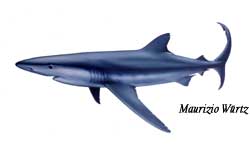The Mediterranean Context
In the early 1980s, economic and political changes throughout the world affected fishing markets. In particular, declining catches and the rising price of traditional food-fish made sharks an inexpensive source of protein. Shark fisheries have sprung up throughout the world since the late 1980s. At the same time the pelagic swordfish and tuna longline fisheries (in which significant numbers of sharks are caught accidentally) have grown dramatically. This has resulted in a significant depletion in the stocks of many shark species, in view of which Scientists have been calling for a legal protection status since the early 1990s.

The Mediterranean hosts a great diversity of shark species and their relatives (86 species comprising 47 sharks, 38 skates and 1 chimera), but direct shark fisheries are quite rare. Mediterranean fisheries are mainly multi-species and multi-gear due to heavily multi-specific stocks. Sharks are usually caught as bycatch of drift-netting and longlining, and as a target species of recreational fisheries. In the case of trawlers, sharks cannot be considered as bycatch, but as part of a bundle of fish caught by this gear.
Mediterranean sharks are threatened with extinction as a result of over-fishing, accidental capture, pollution and demographic pressure on coastal areas. Moreover, sharks have biological characteristics that make them very fragile: slow growth rate, delayed maturity, low fecundity, long reproductive cycles and long life spans. In addition, a lack of biological and fishery data, of suitable models and of validated age estimates, make it hard to understand and assess the status of the shark population.
One might think that a consequence of reducing the number of sharks would be a rise in the number of other fishes, but it is not true: the concept of biodiversity states that "the more species there are, the greater the equilibrium of the ecosystem". Concerned about potential shark stock depletion, international organizations are working towards protected status for threatened sharks species: in November 2002, two sharks species were added to the list of Appendix II of CITES Convention; 3 species are listed as endangered in Appendix II of the Barcelona Convention.
Moreover the FAO is promoting the implementation of International Plans of Action (IPOA) for the conservation and management of sharks. In this respect, a Mediterranean-specific action plan on sharks, drawn up by the IUCN-Centre for Mediterranean cooperation and the SSG, was adopted by parties to the Convention of Barcelona in November 2003.
What is the centre doing? Up to now, the IUCN SSG has been assessing the status of threatened sharks. 185 species of sharks, skates and chimeras have been added to the 2003 IUCN Red List. The IUCN Red List is the world's most comprehensive inventory of the global conservation status of plant and animal species. It uses a set of criteria to evaluate the extinction risk of thousands of species and subspecies.
These criteria are relevant to all species and all regions of the world. With its strong scientific base, the IUCN Red List is recognized as the most authoritative guide to the status of biological diversity.
The overall aim of the Red List is to convey the urgency and scale of conservation problems to the public and policy makers, and to motivate the global community to try to reduce species extinctions.
The IUCN-Mediterranean SSG is consequently assessing the status of cartilaginous fish in the Mediterranean, so that the Red List can be updated and subsequently published. For further details on the Red List see the Red List website. |